
The difference between securing the top position on page one of Google and languishing in obscurity often hinges on a law firm’s backlink profile.
High-quality backlinks are crucial for lawyers and any firm looking to improve its visibility online. Although Google has been deemphasizing their importance recently, backlinks remain one of the most vital Google ranking factors, essential to any law firm’s SEO strategy.
The challenge is that link-building for lawyers isn’t easy. Unlike other quick-fix marketing strategies, effective SEO for law firms requires patience and persistence—you can’t simply buy your way to instant results.
But with the right strategies, high-quality backlinks can significantly increase your website’s authority.
In this article, you will learn:
Let’s begin.
Link building is about getting more websites to have links that point to your site — called inbound links or incoming links. These links serve as pathways for search engines to crawl the web and discover new pages.
Links are like votes that say, “Hey, this website is good!”
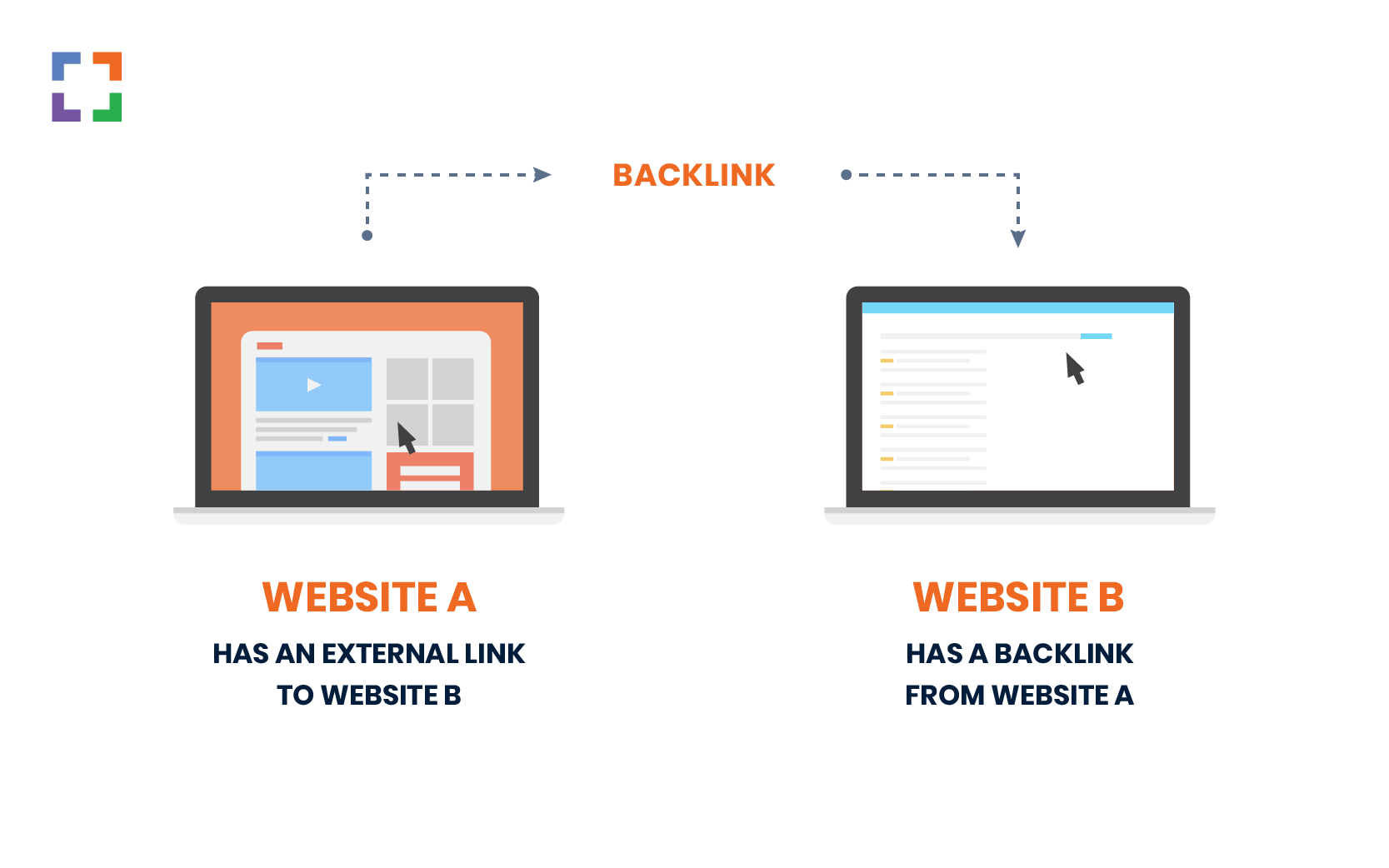
A carefully planned link-building campaign can help your website rank higher on SERPs.
Because Google looks at links from reputable (and relevant) websites as digital votes of confidence, the more people link to your website, the more signals Google receives that your website is a great resource.
Here’s how a backlink normally displays on a web page.

These backlinks are the clickable underlined text that interconnect websites together. They are sometimes referred to as hyperlinks.
Then there’s anchor text — anchor text is the words that encapsulate a hyperlink. Readers do not necessarily see the URL of the link on the page. Instead, they see colored text (often blue but green in this example).

It’s best if the anchor text is descriptive and includes the keywords a website page is attempting to rank for, though you may not have much control over the anchor text that another website uses to link to your pages.
Google says the following about it:
… anchors often provide more accurate descriptions of web pages than the pages themselves.
Link building is essential for law firms for several compelling reasons.
Firstly, backlinks are a confirmed Google ranking factor. The evidence is clear: pages with a high number of backlinks tend to rank higher than those with fewer.
The #1 result in Google, on average, boasts 3.8 times more backlinks than positions 2 through 10, highlighting the direct correlation between the quantity of backlinks and search rankings.
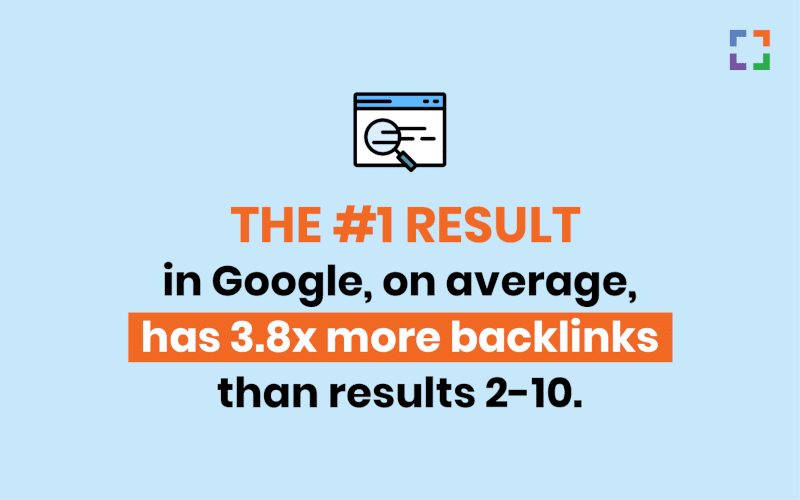
Not only that, but the number of referring domains also matters.
A referring domain is a website that has backlinks to your website. So, a website like Avvo could have ten different backlinks to your website but still be a single referring domain.
Studies have demonstrated that the number of referring domains is more important than number of backlinks. It’s more effective to have five backlinks from five different domains than five backlinks from the same domain.
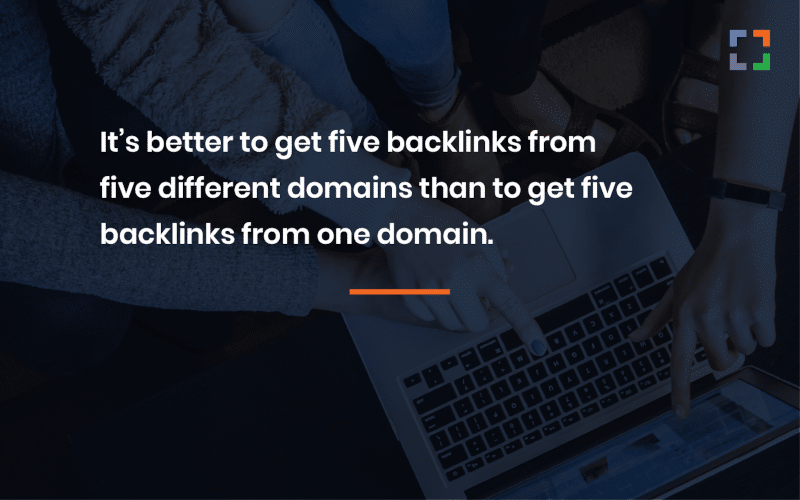
By focusing on both the quantity and quality of backlinks, law firms can dramatically improve their online visibility, search engine rankings, and, consequently, their ability to attract and engage potential clients.
While the principles of link building are grounded in SEO best practices, nothing speaks louder than real results. Let’s look at how ramped-up link building efforts directly contributed to a dramatic increase in organic traffic for our law firm client.
Let’s drill down into the strategies that can build the type of law firm backlink profile that cannot be ignored by Google
We’ve found that the following link-building strategies get the best results.
Contributing well-researched, informative articles to reputable legal blogs or industry-specific websites is a powerful way to gain backlinks.
Not only does it position your firm as a thought leader, but it also leverages the audience and authority of established platforms to enhance your online visibility.
The key is to use your years of experience to provide a unique perspective on an issue near and dear to your practice.
To get started, look for a list of websites to contribute to.
For example, Bogoroch & Associates wrote a guest post on changes to accident benefits for Personal Injury Claims, which resulted in a backlink.
Sometimes, guest blogging goes one better than providing a backlink and leads to a potential client contacting you directly about your services.
A few best practice guidelines with guest posting include:
If possible, get links placed in the body of the post rather than the footer or bio section.
Engaging actively in legal forums and Q&A sites like Quora, Avvo, and HARO can establish your lawyers as helpful, knowledgeable professionals.
Specifically, backlinks from media organizations are extremely valuable. As such, reaching out to reporters via services like HARO can be an important link building strategy for lawyers.
Legal insight, engaging opinion, statistics, and quotations are often sought for news stories in North America, so it’s a win-win. Reporters can improve their news stories, and the lawyer gets a backlink.
To make the most of this strategy, consider the following tips:
One of the best tactics to build high-value backlinks is to create valuable legal content and share it. This helps you in two ways.
Beyond traditional blog posts, diversify the type of content you produce for the best results.
Short, informative videos addressing frequently asked legal questions can serve multiple purposes. These videos not only provide valuable information to potential clients but also encourage other sites to link to your content as a helpful resource. Videos can be particularly effective for simplifying complex legal concepts, making them more accessible to a wider audience.
Here’s an example from our client, Trey Porter.
Infographics can be interactive or static images posted to web pages, blog posts, social media sites, etc.
Well-designed and informative infographics have two characteristics that help search rankings:
Usually, when a graphic is shared, the sharing party should add a backlink to the original graphic to credit you for the work. Personal injury law firm Shea Law Group regularly creates infographics like this one on distracted driving statistics.
Publishing detailed case studies on your website can highlight your firm’s expertise and success in handling specific legal issues. These real-life examples not only showcase your firm’s capabilities but also provide valuable content that other sites may reference and link to, further bolstering your firm’s reputation.
One of the most powerful ways to attract high-quality backlinks and establish your law firm as an authority is by conducting and publishing original research.
Original research can serve as link bait — a valuable piece of content that naturally entices other websites to link to it because of its uniqueness, value, and informativeness.
This could be:
Joining associations should be part of every law firm’s link-building campaign to raise credibility and build social proof. Beyond that, it can also generate backlinks, as you may be entitled to a free profile on the association’s website.
Likewise, winning awards can help your credibility and social proof, as well as generate backlinks from profile pages for recipients. Some awards are peer-nominated, while others use different criteria.
Getting on SuperLawyers (by Thomson-Reuters) Best of the Best and Top lists can earn an award to display on your website and a valuable backlink from a high-ranking legal website.
Success won’t happen overnight. Start by nominating other respected lawyers on websites like National Trial Lawyers Top 100 and the American Association for Justice.
Let your contact know about the nomination, and it may be reciprocated in the future.
The best legal directories get lots of high-intent traffic looking for lawyers, perform well in search, and are high profile.
As such, directories such as Avvo, Lawyers.com, NOLO/Martindale, and HG.org can provide your firm with high-quality citations (mentioned) and backlinks.
Most of these legal directories allow you to create a profile for free. Many of these will include a link to your law firm’s website, boosting search and providing referral traffic. For some, you may need to pay for the privilege.
Here’s a good example of a free Avvo profile with a prominent link to the lawyer’s website.
Following is a broad overview of the main legal directories with their domain rating (evaluation of authority).
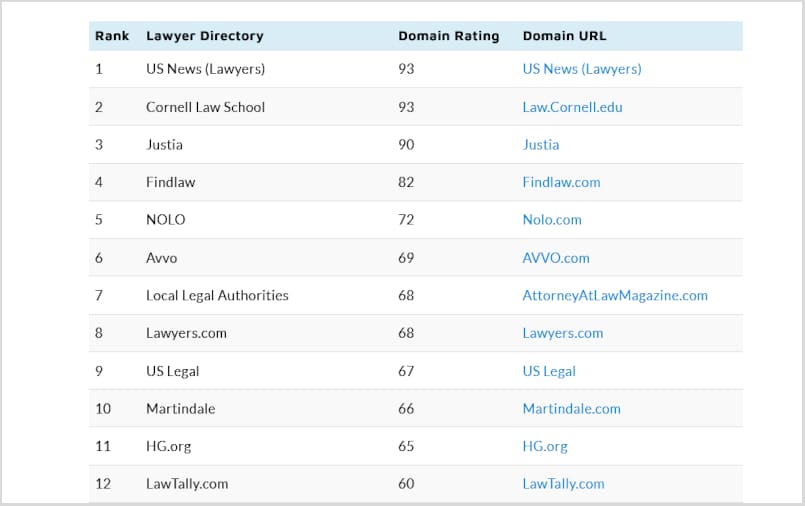
Focus on the most reputable directories at or near the top of this list with a high domain rating/domain authority.
Remember to keep the format consistent when you include your name, address, and contact details in your profile in these directories. This confirms to Google that you’re a real business and helps SEO.
As mentioned already, some directory backlinks may be nofollow. While this robs you of most of the SEO value, the citation will be of value and will help the overall strength of your link profile, which is important too.
Other non-lawyer-specific directories also provide valuable citations, and some may provide backlinks. Here’s a good example with a prominent backlink from Yelp.
Also, consider creating profiles with the following:
Some law firms sponsor charities, sports teams, or local events to give something back, raise their profile and brand awareness in the local community, and generate backlinks.
Even partnering in online events like webinars can yield backlinks. Estate planning attorney Amy McGarry teamed up with Clio for this virtual meetup on estate planning in 2021, earning a precious backlink.
Sponsoring charities and/or fundraisers might generate great community sentiment and a .org backlink, which should also aid your backlink profile.
You can also include a profile with a backlink to your website in local business directories like the Chamber of Commerce and the Better Business Bureau. The Google Business Profile is also an important piece of online “real estate” that includes a link to your site and numerous other benefits for local search.
Another type of sponsorship deal is to provide a scholarship for a student. While this certainly involves some investment, a backlink from a local college or university can be like gold dust for SEO.
Usually, scholarships involve creating a sponsorship program, promoting it on a page, creating a list of targeted .edu domains, and reaching out to the schools and universities to link to your scholarship page — providing a much sought-after backlink.
Personal injury law firm Shook & Stone in Nevada regularly offers $2,500 scholarships, announcing them on a dedicated page on their website.
Many universities link to this Shock & Stone scholarship page, including Eastern Kentucky University, the University of Illinois, and Indiana University.
While social media links are typically nofollow (meaning they don’t directly influence SEO), a strong social media presence can lead to increased visibility and sharing of your content.
This indirect effect can result in more organic backlinks as more users discover and link to your content from their websites or blogs.
I specifically recommend LinkedIn and Facebook to clients.
It’s as easy as sharing content you create on your social media profiles.
The benefits include:
Sometimes, websites mention your business but don’t link to your website. This may be because they forget, include the wrong link, or it’s against their policy.
You can identify when this happens with Google Alerts, which allows you to sign up to receive an email whenever someone publishes content that mentions your firm, like this.

Another option is a tool like Mention, which takes care of the legwork for you but could be a bit overkill.
If there is no link to your site in the content, you can email the website, thank them for their mention, and request a link.
Here’s a template you can use to get started.
Subject: Thank You for Mentioning [Law Firm Name]!
Dear [Website Owner/Editor’s Name],
My name is [Your Name], and I am the [Your Position] at [Law Firm Name], a law firm specializing in [Your Areas of Specialization]. I recently had the pleasure of reading your article, “[Article Title],” and was delighted to see our firm mentioned in the context of [Brief Description of Context].
Your coverage on topics related to our field is insightful and contributes significantly to the public understanding of legal matters. We are genuinely grateful for the recognition and the opportunity to be included among your reputable sources.
I did notice, however, that our mention was not accompanied by a link to our website. If it aligns with your editorial policies, could we kindly request the addition of a hyperlink to [Your Website URL] where [Law Firm Name] is mentioned? This would not only aid your readers in finding more information about our services but also enhance the value of your content by providing direct access to a legal resource.
We are keen on fostering a collaborative relationship with your platform, offering legal insights or expert opinions for your future pieces if ever needed.
Please let me know if adding the link is feasible or if there are any questions about our firm or the services we provide. We are more than willing to assist or contribute in any way possible.
Thank you once again for recognizing [Law Firm Name] in your work. We look forward to the possibility of further engagement and collaboration.
Best regards,
[Your Name]
[Your Position]
[Law Firm Name]
[Your Contact Information]
Do you know who links to your main competitors?
This is important information as the backlink profile of your competitors could be a key reason they outrank you in Google. Understanding who links to them should be a primary goal.
The websites linking to your competitors could be linking to you. A couple of tools can help you do that.
We’ve mentioned them before, but the Ahrefs Site Explorer tool and Moz’s Link Explorer make it easy to check backlink profiles.
Once you identify the leading referral domains, you may be able to reach out to the website owners for links back to your site.
You can also use these tools to:
Utilizing your existing professional and personal network is a strategic yet often overlooked approach to securing valuable backlinks for your law firm.
Here’s a concise guide on how to effectively leverage these relationships:
This one is about contacting a website that has published a piece of content in your niche and requesting a link to a relevant page on your website. It saves you from having to write new content yourself.
However, it only works if your existing content can add significant value to readers of the content on the target site. You may also be asked to pay for the privilege or offer something in return — bear in mind that this is expressly against Google’s webmaster guidelines.
Again, do not overdo this strategy but it can be worth it if the target website is of sufficient authority and relevant to your niche.

“My website continues to dominate all the top website searches in my industry and my business has grown 10-fold as a result.”
Oykhman Criminal Defence
Not all backlinks provide the same value — in fact, some can even negatively affect your rankings.
Backlinks from low-quality and irrelevant websites can be seen as toxic and negatively affect your website. Google may penalize your rankings if you get too many “toxic” backlinks.
You want to seek out backlinks from reputable sources with high domain authority. High-authority websites have many backlinks pointing toward them and are considered favorably by Google.
Here, we’ll discuss some factors to consider when deciding which sources to actively seek backlinks from.
There are two “types” of backlinks you can get:
Dofollow links are the most common and valuable type of link. They tell Google that your website is a reputable and high-quality source of information. When you’re building your backlink profile, these are the gems.
A nofollow link is less valuable but does have a place in a link-building campaign.
A nofollow link says to Google, “We can’t verify the credibility of this information!” They aren’t inherently bad, but they provide little value in the form of link juice.
Nofollow links are commonly used on many sites, especially social media sites and many lawyer directories.
You can tell the difference between the two by looking at the HTML.

While nofollow links don’t provide much value themselves, having a natural link profile may be viewed favorably by Google. It’s usually considered a good strategy to mix dofollow and nofollow links.
To discuss domain authority, we first need to define it.
The domain authority of a website describes how important the site is for a specific targeted subject area [and] relevance with respect to … search words..
Different digital marketing tools have defined different terms that are essentially for the same thing, so you may hear it referred to as domain rating or even authority score.
It’s not a ranking factor in and of itself, but it can be used to predict whether a website is reputable and if it will rank highly.
Websites with high DA have a lot of high-quality referring domains and backlinks pointing at them. This means that Google ranks these websites highly, and getting a backlink from one of them will be valuable.
To evaluate a website’s DA and spam score effectively, use Moz’s free Domain Analysis tool.
Meanwhile, here are some metrics you can use to measure link quality:
Link equity (or link juice) is the value that one website can pass to yours by linking to you.
The value of a backlink (or how much link juice it’ll provide) can be determined by looking at several factors we’ve already discussed.
You get the most link equity from a do-follow backlink that’s placed in the body of a relevant and authoritative website.
If a referring domain is stingy with its backlinks, receiving one is viewed more favorably and will pass on more link juice.
And the more link juice you receive, the more likely Google will rank your website highly.
Now, let’s say you get one backlink from a very high-quality website. How do you make the most of it?
The link juice is passed directly to the exact page being linked to, but you can pass some of it along to other pages on your website with strategically placed internal links.
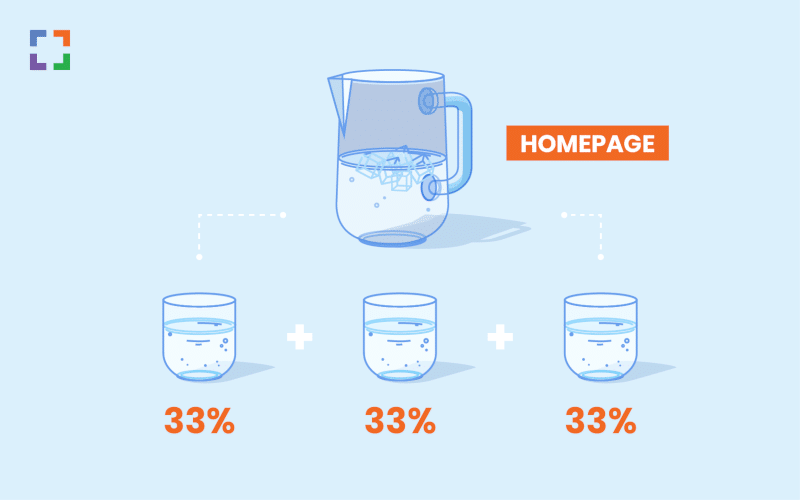
Let’s say you receive a link to your blog post on “How to file for divorce in Austin.” On that page, you can link to other relevant pages on your website and pass on some of that link equity to those pages as well.
The link equity you receive on the main page will pass to other pages you link to.
The journey to boosting your law firm’s online visibility must be navigated with ethical integrity, adhering closely to search engine guidelines. With Google’s constant updates, staying informed and compliant is more crucial than ever.
Google’s Search Essentials serve as the cornerstone for ethical SEO. These guidelines advocate for the creation of quality content that naturally attracts links, steering clear of manipulative practices.
For law firms, this underscores the importance of producing valuable, informative content that naturally invites linking. Violating these guidelines can lead to severe penalties, such as a loss in search rankings or even removal from search results.
In Google’s March 2024 update, they highlighted concerns over “site reputation abuse,” where high-reputation sites host low-quality content from third parties, aiming to exploit the host site’s strong standing.
Google explicitly states:
This update, effective from May 5, signals Google’s increased vigilance against spammy content and directly relates to common link-buying strategies.
My recommendation moving forward is to unequivocally never purchase links.
Black-hat SEO practices, including the purchase of links, are a direct violation of search engine guidelines.
Buying links is particularly problematic because:
If you’ve made it to the end and decided you don’t have the time to invest in learning and implementing SEO on your own, we can help.
JurisPage is a marketing agency that works solely with law firms. We know the ins and outs of legal marketing and are here to help. Schedule a free consultation with us today.
It may not be something you look after personally for your firm, but link building for lawyers should not be overlooked if you’re doing any law firm marketing.
Law firms have a distinct advantage over other business types for generating high-quality backlinks — a wealth of specialist knowledge and topical authority. But expecting to naturally attract enough high-quality links simply by the brilliance of your content could be depriving your firm of valuable traffic, leads, and paying clients.
Work with your SEO experts to adopt the strategies outlined above, and over time (months and years, not weeks), build a backlink profile that Google simply cannot ignore.
This means attracting a natural and diverse array of backlinks with a good mixture of authority websites that reflect your law firm’s location, clients, practice areas, and the legal industry in general.
Ready to maximize your marketing budget? Fill out the contact form or call us today for a complimentary consultation. We will listen to your story, work to define your business objectives, and recommend an approach to deliver maximum ROI for your firm.
7500 Flying Cloud Drive
Suite 625
Eden Prairie, MN 55344
10900 Stonelake Boulevard
Building 2, Suite 100
Austin, TX 78759
2005 Sheppard Ave E
Suite 402
Toronto, ON M2J 5B4
By using this website, you consent to our use of cookies in accordance with our Cookie Policy. Cookies help us enhance your browsing experience and provide personalized content. If you do not agree to our use of cookies, please adjust your browser settings accordingly.